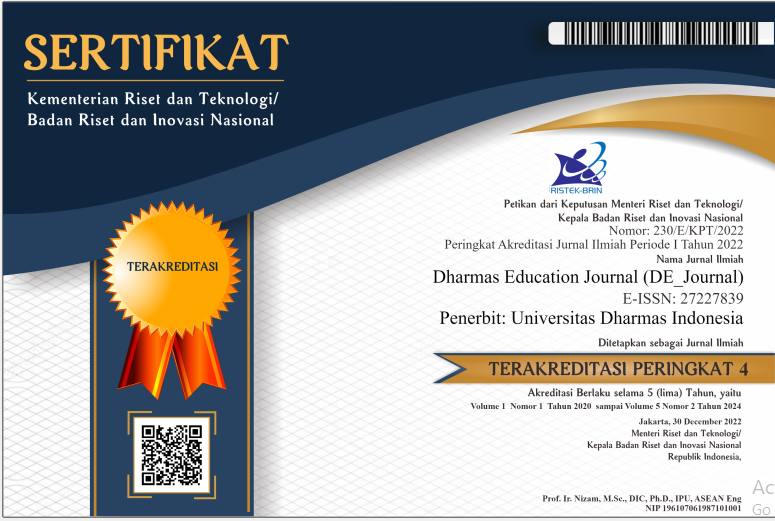IMPLEMENTASI AUTHENTIC ASESSMENT PADA PENDIDIKAN VOKASI TEKNIK INFORMATIKA
IMPLEMENTASI AUTHENTIC ASESSMENT PADA PENDIDIKAN VOKASI TEKNIK INFORMATIKA
DOI:
https://doi.org/10.56667/dejournal.v1i2.147Keywords:
Authentic Asesssement, Pembelajaran Abad 21, ImplementasiAbstract
This research is motivated by the lack of competence of educators in implementing effective and meaningful assessments and in accordance with the development of 21st century learning. The purpose of this study was to determine the lecturers' understanding of authentic assessment, implementation and suitability of authentic assessment in computer network learning, perceptions of lecturers and students in carrying out authentic assessments, and lecturer obstacles in implementing authentic assessments in computer network learning in the informatics engineering study program. This research is descriptive research. This research includes population research with the subject of 6 lecturers of informatic engineering study program and 34 students taking computer network courses. Data were collected through questionnaires, interviews and document review. Data were analyzed using descriptive analysis. The results showed that; The knowledge and competence of lecturers is sufficient to make authentic assessments according to authentic assessment standards. Lecturers are able to prepare authentic assessment tools, and are able to use web-based authentic assessment media. The perceptions of lecturers and students towards authentic assessment in terms of planning, implementing techniques and instruments in assessing the three aspects of learning fall into the good category. Time limitations, number of components / criteria, lack of student motivation in innovative learning are still obstacles in the implementation of the assessment. Overall authentic assessment has been well implemented as an assessment innovation in 21st century education.
Downloads
References
Association, N. E. (2010). Preparing 21st Century Students for a Global Society: An Educator’s Guide to the “Four Cs. 38.
Bialik, M., & Fadel, C. (2015). Skills for the 21st centuty: What should studenst learn? Center for Curriculum Redesign, (May), 1–18.
Efendi, R., Jama, J., & Yulastri, A. (2019). Development of Competency Based Learning Model in Learning Computer Networks. Journal of Physics: Conference Series, 1387(1), 0–6. https://doi.org/10.1088/1742-6596/1387/1/012109
Eko Risdianto. (2019). Analisis Pendidikan Indonesia di Era Revolusi Industri 4.0.
Friadi, J., Ganefri, Ridwan, & Efendi, R. (2020). Development of product based learning-teaching factory in the disruption era. International Journal of Advanced Science and Technology, 29(6), 1887–1898.
Majid, A. (2015). Penilaian Autentik Proses dan Hasil Belajar. PT. Remaja Rosdakarya.
Mueller, J. (2005). The Authentic Assessment Toolbox : Enhancing Student Learning through Online Faculty Development. Merlot Journal of Online Learning & Teaching, 1(1), 7.
Nitko, A. J., & Brookhart, S. M. (2007). Educational Assessment of Students. Pearson Merrill Prentice Hall.
Peppler, K. (2017). 21st-Century Skills. The SAGE Encyclopedia of Out-of-School Learning. https://doi.org/10.4135/9781483385198.n301
RISTEKDIKTI. (2018). Pengembangan Iptek dan Pendidikan Tinggi di Era Revolusi Industri 4.0. RISTEKDIKTI. Retrieved from http://www.kopertis6.or.id/component/content/article/49/4107-pengembangan-iptek-dan-pendidikan-tinggi-di-era-revolusi-industri-40.html
Sugiyono. (2015). Metode Penelitian & Pengembangan Research and Development untuk Bidang Pendidikan, Manajemen, Sosial, Teknik. Bandung: Alfabeta.
Sukardi. (2010). Evaluasi Pendidikan. Jakarta: Bumi Aksara.
Suryana, F., Jalinus, N., Rahmad, R., & Efendi, R. (2020). Cooperative Project Based Learning Models in Programming Languages : A Proposed. International Journal of Advanced Science and Technology, 29(06), 1876–1886.
Trilling, B., & Fadel, C. (2009). 21st Century Skills: Learning for Life in Our Times. Retrieved from www.josseybass.com%0ANo
Villarroel, V., Bloxham, S., Bruna, D., Bruna, C., & Herrera-Seda, C. (2018). Authentic assessment: creating a blueprint for course design. Assessment and Evaluation in Higher Education, 43(5), 840–854. https://doi.org/10.1080/02602938.2017.1412396
Wangid, M. N., Mustadi, A., Senen, A., & Herianingtyas, N. L. R. (2017). The evaluation of authentic assessment implementation of Curriculum 2013 in Elementary School. Jurnal Penelitian Dan Evaluasi Pendidikan, 21(1), 104. https://doi.org/10.21831/pep.v21i1.15779
Downloads
Published
How to Cite
Issue
Section
License
Copyright (c) 2020 DE_JOURNAL (Dharmas Education Journal)

This work is licensed under a Creative Commons Attribution-NonCommercial-NoDerivatives 4.0 International License.
Makalah yang disampaikan diasumsikan tidak mengandung bahan propietary yang tidak dilindungi oleh hak paten












